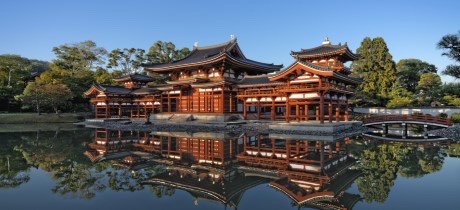LFP - Large-Format-Printing
Agfa Graphics prints World Heritage Japanese temple doors on Anapurna wide-format printer

Tuesday 24. November 2015 - When the printing experts at Agfa Graphics Japan got the request to recreate the doors of an ancient Buddhist temple, they embarked on a fascinating journey which required extensive printing, substrate and color management expertise.
The By?d?-in is a Buddhist temple near Kyoto, Japan, which is registered as Japanese National Treasure and World Heritage Site. It appears on the backside of the Japanese 10 yen coin. Its most famous part, and the only remaining original building, is the Phoenix Hall (??? H??-d?), constructed in 1053.
As the paint on the original west doors to the H??-d? was fading, Monsho Kamii, chief priest of the temple, had a special team investigate them and collect remaining small amounts of paint in order to simulate the colors and the image, using the latest digital techniques. This painstaking effort cost the team about ten years. The chief priest then contacted Agfa Graphics Japan with the simulated image file and the request to reconstruct the doors. The choice for Agfa Graphics was no coincidence. As a 150 year old graphics company which has grown its business steadily, the temple team was confident that we would have the printing and color management expertise and knowhow that was required. Ecology, health and safety were additional determining factors in the choice for Agfa Graphics. The chief priest felt comfortable by the fact that we develop and manufacture our UV-inkjet inks in-house.
Agfa Graphics experts tried to match the expected colors as accurately as possible using in-house color management technology and printing techniques. An Anapurna 2050i wide-format inkjet printer was used to print on the 400-year cold Japanese cypress wood that the two new doors are made of. It wasnt a straightforward job though. As the 1.2m by 2.5m doors werent flat, a special technique was developed to print on the curved surface of the frames with the help of a special tool that was created with a 3D printer. In addition, a particular kind of white ink was used to imitate the original white parts of the door.
When the doors were ready, the Agfa Graphics team received high praise from the temples chief priest for the result they had achieved. Until the 6th of December, the reconstructed doors will be exhibited at the museum of the Byodoin Temple, with explanations about the underlying efforts and processes of the restoration, including the investigation of the material, its structure, and the reproduction techniques. After that date, the doors will be mounted in their new hinges in the temple, where they will stay for an indeterminate period of time.
“The moment I saw the completed door, I couldnt withhold my tears. To see them reconstructed had been my dearest wish for twenty years.”
Mr. Monsho Kamii, Chief priest of the By?d?-in temple
